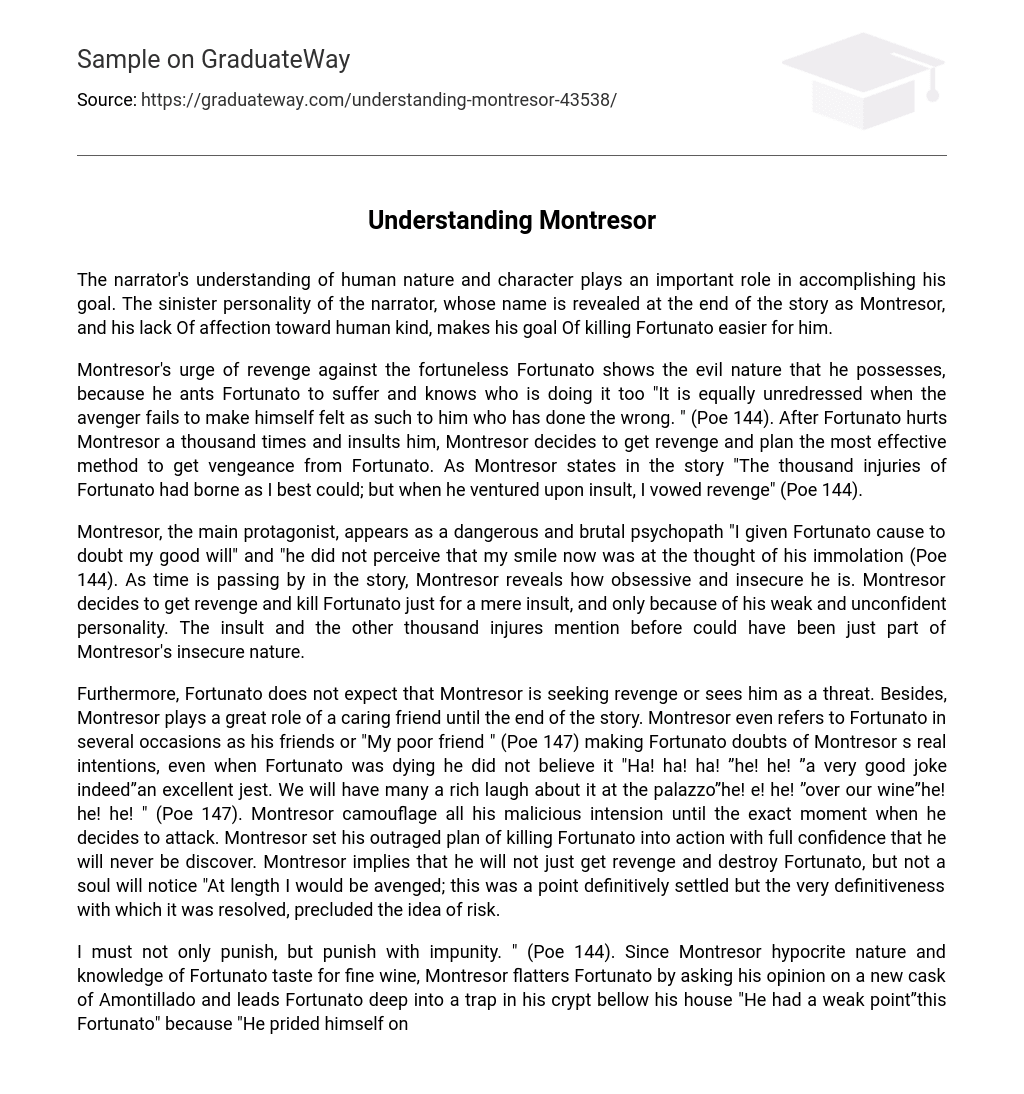The narrator’s understanding of human nature and character plays an important role in accomplishing his goal. The sinister personality of the narrator, whose name is revealed at the end of the story as Montresor, and his lack Of affection toward human kind, makes his goal Of killing Fortunato easier for him.
Montresor’s urge of revenge against the fortuneless Fortunato shows the evil nature that he possesses, because he ants Fortunato to suffer and knows who is doing it too “It is equally unredressed when the avenger fails to make himself felt as such to him who has done the wrong. ” (Poe 144). After Fortunato hurts Montresor a thousand times and insults him, Montresor decides to get revenge and plan the most effective method to get vengeance from Fortunato. As Montresor states in the story “The thousand injuries of Fortunato had borne as I best could; but when he ventured upon insult, I vowed revenge” (Poe 144).
Montresor, the main protagonist, appears as a dangerous and brutal psychopath “I given Fortunato cause to doubt my good will” and “he did not perceive that my smile now was at the thought of his immolation (Poe 144). As time is passing by in the story, Montresor reveals how obsessive and insecure he is. Montresor decides to get revenge and kill Fortunato just for a mere insult, and only because of his weak and unconfident personality. The insult and the other thousand injures mention before could have been just part of Montresor’s insecure nature.
Furthermore, Fortunato does not expect that Montresor is seeking revenge or sees him as a threat. Besides, Montresor plays a great role of a caring friend until the end of the story. Montresor even refers to Fortunato in several occasions as his friends or “My poor friend ” (Poe 147) making Fortunato doubts of Montresor s real intentions, even when Fortunato was dying he did not believe it “Ha! ha! ha! ”he! he! ”a very good joke indeed”an excellent jest. We will have many a rich laugh about it at the palazzo”he! e! he! ”over our wine”he! he! he! ” (Poe 147). Montresor camouflage all his malicious intension until the exact moment when he decides to attack. Montresor set his outraged plan of killing Fortunato into action with full confidence that he will never be discover. Montresor implies that he will not just get revenge and destroy Fortunato, but not a soul will notice “At length I would be avenged; this was a point definitively settled but the very definitiveness with which it was resolved, precluded the idea of risk.
I must not only punish, but punish with impunity. ” (Poe 144). Since Montresor hypocrite nature and knowledge of Fortunato taste for fine wine, Montresor flatters Fortunato by asking his opinion on a new cask of Amontillado and leads Fortunato deep into a trap in his crypt bellow his house “He had a weak point”this Fortunato” because “He prided himself on is connoisseurship in wine” (Poe 144). Therefore, Montresor allures Fortunato in his own trap, because of his eagerness for Amontillado. But Fortunato only finds his death in that search.
Fortunato is taken to the crypt, where the Amontillado is supposed to be, and Montresor chain him and buried him alive. Fortunato last words were a wish for mercy “For the love of God, Montresor! ” (Poe 148) The fact that an insult was cause for a murder, demonstrates Montresor’s narcissism and poor understanding of justice, but also the ability of Montresor to control Fortunato into his own trap “Instead, e cleverly plays on his victim’s vanity so that it is Fortunato who is always begging to go forward into the vaults” (Reynolds 184).
The entire nature of the story is based in an insult that induces a diabolical revenge, and how Montresor uses his hypocrite personality until the precise time to accomplish his goal. Montresors lack of affection toward human kind or even the person that he names as his friend is beyond belief; he almost do not even hesitate when he is about to kill Fortunato “For a brief moment I hesitated”I trembled. ” “But the thought of an instant reassured me. I placed my hand pon the solid fabric of the catacombs, and felt satisfied. (Poe 148). The moral idea learned from this story is that revenge is not always the way to fix any harms. Offences and insults are really hurtful some occasions, but they should never end in murder.





